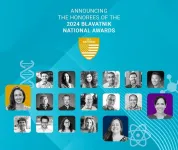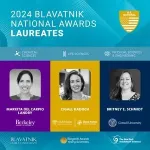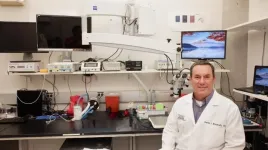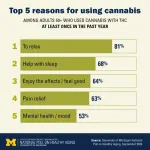(Press-News.org) NEW YORK, September 12, 2024 – For the second time, the Blavatnik Family Foundation and The New York Academy of Sciences named three women scientists as Laureates of the Blavatnik National Awards for Young Scientists. Each will receive $250,000, the largest unrestricted scientific prize offered to America’s most promising, faculty-level scientific researchers under 42. Three independent juries – one each for life sciences, chemical sciences, and physical sciences & engineering – composed of some of America’s most distinguished scientists selected the three winning Laureates. An additional 15 Finalists will each receive $15,000.
The 2024 Blavatnik National Awards received 331 nominations from 172 institutions in 43 U.S. states. Nominees must be faculty-level scientific researchers, 42 years of age or younger.
The Blavatnik National Awards for Young Scientists will celebrate the 2024 Laureates and Finalists and the 2024 Blavatnik Regional Awards Laureates and Finalists in a gala ceremony on October 1, 2024, at the American Museum of Natural History in New York.
The 2024 winning Laureates are:
2024 Laureate in Life Sciences: Cigall Kadoch, Ph.D., Dana-Farber Cancer Institute, Harvard Medical School & Howard Hughes Medical Institute (Molecular & Cellular Biology)—Working to discover and characterize chromatin remodeling complexes, understanding how their disruption leads to human disease, and developing a new class of therapeutics
Healthy cells rely on the intricate collaboration of millions of biological molecules; even minor perturbations in these interactions can lead to diseases like cancer. In a series of groundbreaking studies, Cigall Kadoch has decoded the role of ATP-dependent chromatin remodelers—complex molecular machines made up of dozens of interacting proteins—in regulating DNA accessibility and gene expression. The Kadoch Lab also unraveled how disease-causing mutations in these complexes impact their structure and function in an expanding list of diseases that includes cancer, neurodevelopmental disorders, and immunodeficiencies. Dr. Kadoch has built upon these discoveries to develop novel therapeutics, which are being tested in clinical trials and could revolutionize the treatment of diverse maladies.
2024 Laureate in Chemical Sciences: Markita del Carpio Landry, Ph.D., University of California, Berkeley (Chemical Engineering)—Pioneering nanoscale chemical tools to address disparate challenges in human health and sustainability
The behavior of chemicals within and between cells of the body still holds many secrets to how life operates. By manipulating these basic chemical interactions of life, using very small particles to uncover new insights and tools for biology, Landry has applied new nanobiotechnology towards a wide range of tasks, from measuring the transfer of chemicals between synapses in the brain to bioengineering plant genetics. Landry’s strategies for applying nanobiotechnology tools are already paving the way for more resilient crops and new treatments for neurological disease ranging from neurodegeneration to autism spectrum disorders.
2024 Laureate in Physical Sciences & Engineering: Britney E. Schmidt, Ph.D., Cornell University (Physical Earth Sciences)—Advancing climate science and planetary habitability studies through groundbreaking research on ice-ocean interactions and innovative exploration of Earth’s polar regions and icy planetary bodies
In order to better predict the impact of climate change we must understand the interactions between the Earth's oceans and ice. Britney E. Schmidt and her team designed, built, and deployed Icefin, a remotely operated vehicle that provides unprecedented insights into Antarctic ice shelf melting and ocean circulation. Schmidt’s work solves key problems in ice dynamics and interaction with the ocean and offers novel comprehensive views of sub-ice environments. Critically, this research shows how interactions between the ice, ocean, and seafloor control how glaciers respond to the warming ocean. Schmidt also applies Earth-based ice studies to solar system icy worlds to further our understanding of extraterrestrial environments. Schmidt’s contributions have earned widespread recognition, including inclusion in Time Magazine's 100 Most Influential People of 2023.
“On behalf of the Blavatnik Family Foundation, I congratulate this year’s outstanding Laureates and Finalists for their exceptional research. They are among the preeminent leaders of the next generation of scientific innovation and discovery,” said Len Blavatnik, founder of Access Industries and the Blavatnik Family Foundation and a member of the President’s Council of The New York Academy of Sciences.
Nicholas B. Dirks, president and CEO of The New York Academy of Sciences, said, “The New York Academy of Sciences has always championed women in science. We are thrilled to celebrate, for the second time in the United States, that all three of the scientists named the 2024 Blavatnik National Awards Laureates are women working in their respective fields to use science to benefit the public good.”
FINALISTS
The following scientists have been named Finalists in their respective categories:
Life Sciences
Wei Gao, Ph.D., California Institute of Technology (Biomedical Engineering & Biotechnology) Developed advancements in wearable biomolecular sensors, allowing for continuous, real-time monitoring and early diagnosis of various health conditions without requiring invasive medical procedures.
Kaiyu Guan, Ph.D., University of Illinois Urbana-Champaign (Agriculture & Animal Sciences)
Developed revolutionary technology to enhance our understanding of agricultural production systems and innovating transformative solutions to achieve co-sustainability of agricultural productivity and environmental quality.
Sergiu Paşca, M.D., Stanford University (Neuroscience & Developmental Biology)
Uncovered transformative and therapeutically relevant insights into the molecular and cellular steps underlying the assembly of the human brain and the mechanisms leading to neuropsychiatric disease.
Sohini Ramachandran, Ph.D., Brown University (Ecology & Evolutionary Biology)
Established quantitative methods that reveal the causes and consequences of human genetic variation while advancing the goal of personalized medicine for all.
Christoph A. Thaiss, Ph.D., University of Pennsylvania (Neuroscience & Immunology)
Made significant advances in decoding the mechanisms by which the communication between environment, body, and brain mediates the impact of lifestyle factors on common human diseases.
Chemical Sciences
Joseph Cotruvo, Jr. Ph.D., The Pennsylvania State University (Biochemistry & Structural Biology)
Discovered and engineered biomolecules to sustainably harvest and purify rare metals, which are used in advanced technology, from electronic waste and the environment.
Garret Miyake, Ph.D., Colorado State University (Polymer Chemistry)
Made ground-breaking advances across polymer and organic chemistry, including inventing light-driven synthesis methods, novel plastics that are chemically recyclable, and light-reflecting coatings to reduce energy needs.
David Nagib, Ph.D., The Ohio State University (Organic Chemistry)
Stabilized traditionally unstable molecules, such as carbenes and free radicals, to discover faster, more effective, and previously unknown chemical mechanisms for synthesizing pharmaceuticals.
Yogesh Surendranath, Ph.D., Massachusetts Institute of Technology (Inorganic & Solid-State Chemistry)
Developed a molecular-level understanding of how charges arrange at electrified surfaces, like battery electrodes, and new chemical reactions to decarbonize fuel and chemical synthesis.
Wei Xiong, Ph.D., University of California San Diego (Physical Chemistry)
Established the experimental foundations of polariton chemistry, which describes hybrid, excited states of molecules, and engineered photonic cavities to provide better control over chemical reactions.
Physical Sciences & Engineering
Anima Anandkumar, Ph.D., California Institute of Technology (Computer Science)
Made ground-breaking advancements in AI to address practical scientific challenges, drastically accelerating simulation of complex phenomena like weather forecasting, scientific simulations, engineering design and scientific discovery.
Polina Anikeeva, Ph.D., Massachusetts Institute of Technology (Materials Science & Nanotechnology)
Integrated nanomaterials synthesis and electronic device design to develop neurotechnologies, artificial limbs, and soft robotics that advance our understanding and treatment of neurological disorders.
Ivan Z. Corwin, Ph.D., Columbia University (Applied Mathematics)
Expanded “Extreme Diffusion Theory” to model complex physical systems like the growth of tumors, the propagation of nerve signals, and the early spread of pandemics.
Alexey V. Gorshkov, Ph.D., National Institute of Standards and Technology & University of Maryland (Theoretical Physics)
Advanced the design of large interacting quantum systems through pioneering research at the intersection of quantum physics and information science with groundbreaking implications for quantum computers, sensors, and networks.
Maryam Shanechi, Ph.D., University of Southern California (Electrical Engineering)
Pioneered research at the intersection of engineering, AI, and neuroscience to develop advanced neurotechnologies that decode and regulate brain activity for treating brain disorders.
About the Blavatnik Awards for Young Scientists
The Blavatnik Awards for Young Scientists, established by the Blavatnik Family Foundation in 2007 and independently administered by The New York Academy of Sciences, initially identified outstanding regional scientific talent among faculty and postdoctoral students in New York, New Jersey, and Connecticut. The Blavatnik National Awards, honoring faculty-rank scientists throughout the United States, were first awarded in 2014 and were expanded in 2017 to honor faculty-rank scientists in the United Kingdom and Israel. By the end of 2024, the Blavatnik Awards will have awarded prizes totaling $17.4 million and, to date, has honored over 470 scientists.
Blavatnik Awards scholars are driving economic growth by embarking on new scientific trajectories to pursue high-risk, high-reward scientific research. To date, Blavatnik Awards honorees have founded 72 companies. After recognition by the Blavatnik Awards, 30% of past honorees obtained a patent or filed a patent application, 75% have started a new research direction, and 11% have started a new collaboration with another Blavatnik Awards honoree.
Visit blavatnikawards.org for further information.
About the Blavatnik Family Foundation
The Blavatnik Family Foundation provides many of the world’s best researchers, scientists and future leaders with the support and funding needed to solve humankind’s greatest challenges. Led by Len Blavatnik, founder of Access Industries, the Foundation advances and promotes innovation, discovery and creativity to benefit the whole of society. Over the past decade, the Foundation has contributed over US$1 billion to more than 250 organizations. See more at www.blavatnikfoundation.org.
About The New York Academy of Sciences
The New York Academy of Sciences is an independent, not-for-profit organization that, since 1817, has been committed to advancing science for the benefit of society. With more than 20,000 members in 100 countries, the Academy advances scientific and technical knowledge, addresses global challenges with science-based solutions, and sponsors a wide variety of educational initiatives at all levels for STEM and STEM-related fields. The Academy hosts programs and publishes content in the areas of life and physical sciences, the social sciences, nutrition, artificial intelligence, computer science, and sustainability. The Academy also provides professional and educational resources for researchers across all phases of their careers. The Blavatnik Awards for Young Scientists is part of a series of prominent awards and scholarship programs that the Academy and its partners present each year to accomplished early-career and established scientists worldwide. These initiatives, along with education and professional development programs for students and young scientists, reflect the Academy’s broader commitment to strengthening and diversifying the pipeline for skilled and talented scientists globally. Please visit us online at www.nyas.org.
Media contact
Kamala Murthy, kmurthy@nyas.org, 212-298-3740
END
2024 Blavatnik National Awards for Young Scientists announced
A molecular biologist from Dana-Farber Cancer Institute, a chemical engineer from UC Berkeley, and an earth scientist from Cornell University are this year’s Laureates.
2024-09-12
ELSE PRESS RELEASES FROM THIS DATE:
TTUHSC’s Jerry H. Hodge School of Pharmacy establishes Brain Drug Discovery Center
2024-09-12
After more than a decade of research growth and recruiting efforts to build strong, collaborative research programs, the Jerry H. Hodge School of Pharmacy in Amarillo has developed the Brain Drug Discovery Center, the newest Texas Tech University Health Sciences Center (TTUHSC) research center.
Created from two existing pharmacy school centers — the Center for Blood-Brain Barrier Research and the Cancer Biology Research Center — the Brain Drug Discovery Center will focus on ...
Collaborative three-campus QB3 research team awarded $12 million CIRM grant to study origins of autism in diverse population
2024-09-12
A QB3-led team uniting researchers from the University of California campuses at Berkeley, San Francisco, and Santa Cruz was awarded a $12 million grant from the California Institute for Regenerative Medicine (CIRM) to investigate the origins of autism using sophisticated cellular models called “neural organoids.”
This grant is the first funding brought in by QB3’s Collaborative Research initiative, which was recently created to address major challenges in human health by leveraging research talent and resources across the UC campuses served by QB3.
"We are grateful for the support provided by the CIRM team to craft a highly successful application ...
Cannabis and older adults: Poll shows current use patterns, beliefs and risks
2024-09-12
Whether they’re using it for recreational or medical reasons, a sizable percentage of people in their 50s and older have smoked, eaten, drunk or applied to their skin at least one form of cannabis in the past year, a new poll shows.
In all, 21% of people age 50 and older said they used a form of cannabis that contains the psychoactive compound THC at least once in the past year, according to new findings from the University of Michigan National Poll on Healthy Aging. The poll report focuses on use of cannabis ...
Dr. Baptiste Lacoste, of the Ottawa Hospital Research Institute and uOttawa Brain and Mind Research Institute, receives a SynGAP Research Fund (SRF) Grant for Groundbreaking Research on Vascular and M
2024-09-12
Mill Valley, CA – September 12, 2024 – The SynGAP Research Fund 501(c)(3) announces a $128,888 grant to Dr. Baptiste Lacoste at the uOttawa Brain and Mind Research Institute (uOBMRI) and Ottawa Hospital Research Institute (OHRI). This grant supports Dr. Lacoste's pioneering research project aimed at exploring the role of vascular and metabolic dysfunction in SYNGAP1-Related Non-Syndromic Intellectual Disability (SYNGAP1-NSID), also known as SYNGAP1-Related Disorders (SRD).
With elevated energy demands and a limited capacity to store ...
$75,000 prize inspired by 18th century Scots economist attracts global entries
2024-09-12
A Scottish $75,000 prize for “radical innovation” has shortlisted four academics from around the world.
Named after Panmure House, the former Edinburgh home of 18th century Scots economist and philosopher Adam Smith, the Panmure House Prize rewards groundbreaking research that contributes to advancing long-term thinking and innovation.
After a record number of entries for the 2024 prize, its fourth year, the judges have drawn up a shortlist of four submissions from the United States, Spain ...
SOPHiA GENETICS announces poster presentations at ESMO 2024
2024-09-12
Boston, MA and Rolle, Switzerland, September 12, 2024 – SOPHiA GENETICS (Nasdaq: SOPH), a cloud-native healthcare technology company and a global leader in data-driven medicine, will be presenting multiple posters at the European Society for Medical Oncology (ESMO) Congress 2024 being held in Barcelona, Spain September 13-17, 2024. The ESMO Congress is a globally influential oncology platform for clinicians, researchers, patient advocates, journalists and healthcare industry representatives from all over the world.
The details of the presentations are as follows:
Title: ...
New fossil fish species scales up evidence of Earth’s evolutionary march
2024-09-12
Access VIDEO, photos and captions here
Climate change and asteroids are linked with animal origin and extinction – and plate tectonics also seems to play a key evolutionary role, ‘groundbreaking’ new fossil research reveals.
The discovery of an exceptionally well preserved ancient primitive Devonian coelacanth fish in remote Western Australia has been linked to a period of heightened tectonic activity, or movement in the Earth’s crust, according ...
Personal carbon footprint of the rich is vastly underestimated by rich and poor alike, study finds
2024-09-12
The personal carbon footprint of the richest people in society is grossly underestimated, both by the rich themselves and by those on middle and lower incomes, no matter which country they come from. At the same time, both the rich and the poor drastically overestimate the carbon footprint of the poorest people.
An international group of researchers, led by the Copenhagen Business School, the University of Basel and the University of Cambridge, surveyed 4,000 people from Denmark, India, Nigeria and the United States about inequality in personal carbon footprints – the total amount of greenhouse gases ...
Tumor-induced B cell changes reveal potential biomarker for treatment response in triple negative breast cancer
2024-09-12
HOUSTON – (Sept. 12, 2024) – Researchers at Baylor College of Medicine and collaborating institutions have discovered new insights into tumor-induced B cell changes in blood and bone marrow of triple negative breast cancer patients. The findings, published in Nature Cell Biology, show two distinct patterns of B cell abnormalities that could serve as blood biomarkers for determining likelihood of response to standard-of-care chemotherapy and immunotherapy.
“Even with significant advances in immunotherapy, ...
Ehrapy: A new open-source tool for analyzing complex health data
2024-09-12
Ehrapy is intended to fill a critical gap in the analysis of health data, says Lukas Heumos, one of the main developers and a scientist at the Institute of Computational Biology at Helmholtz Munich and the Technical University of Munich (TUM): “Until now, there have been no standardized tools for systematically and efficiently analyzing diverse and complex medical data. We’ve changed that with ehrapy.” The team behind ehrapy comes from biomedical research and has extensive experience in analyzing complex scientific datasets. “The healthcare sector faces similar challenges in data analysis as ...
LAST 30 PRESS RELEASES:
Novel structural insights into Phytophthora effectors challenge long-held assumptions in plant pathology
Q&A: Researchers discuss potential solutions for the feedback loop affecting scientific publishing
A new ecological model highlights how fluctuating environments push microbes to work together
Chapman University researcher warns of structural risks at Grand Renaissance Dam putting property and lives in danger
Courtship is complicated, even in fruit flies
Columbia announces ARPA-H contract to advance science of healthy aging
New NYUAD study reveals hidden stress facing coral reef fish in the Arabian Gulf
36 months later: Distance learning in the wake of COVID-19
Blaming beavers for flood damage is bad policy and bad science, Concordia research shows
The new ‘forever’ contaminant? SFU study raises alarm on marine fiberglass pollution
Shorter early-life telomere length as a predictor of survival
Why do female caribou have antlers?
How studying yeast in the gut could lead to new, better drugs
Chemists thought phosphorus had shown all its cards. It surprised them with a new move
A feedback loop of rising submissions and overburdened peer reviewers threatens the peer review system of the scientific literature
Rediscovered music may never sound the same twice, according to new Surrey study
Ochsner Baton Rouge expands specialty physicians and providers at area clinics and O’Neal hospital
New strategies aim at HIV’s last strongholds
Ambitious climate policy ensures reduction of CO2 emissions
Frontiers in Science Deep Dive webinar series: How bacteria can reclaim lost energy, nutrients, and clean water from wastewater
UMaine researcher develops model to protect freshwater fish worldwide from extinction
Illinois and UChicago physicists develop a new method to measure the expansion rate of the universe
Pathway to residency program helps kids and the pediatrician shortage
How the color of a theater affects sound perception
Ensuring smartphones have not been tampered with
Overdiagnosis of papillary thyroid cancer
Association of dual eligibility and medicare type with quality of postacute care after stroke
Shine a light, build a crystal
AI-powered platform accelerates discovery of new mRNA delivery materials
Quantum effect could power the next generation of battery-free devices
[Press-News.org] 2024 Blavatnik National Awards for Young Scientists announcedA molecular biologist from Dana-Farber Cancer Institute, a chemical engineer from UC Berkeley, and an earth scientist from Cornell University are this year’s Laureates.









